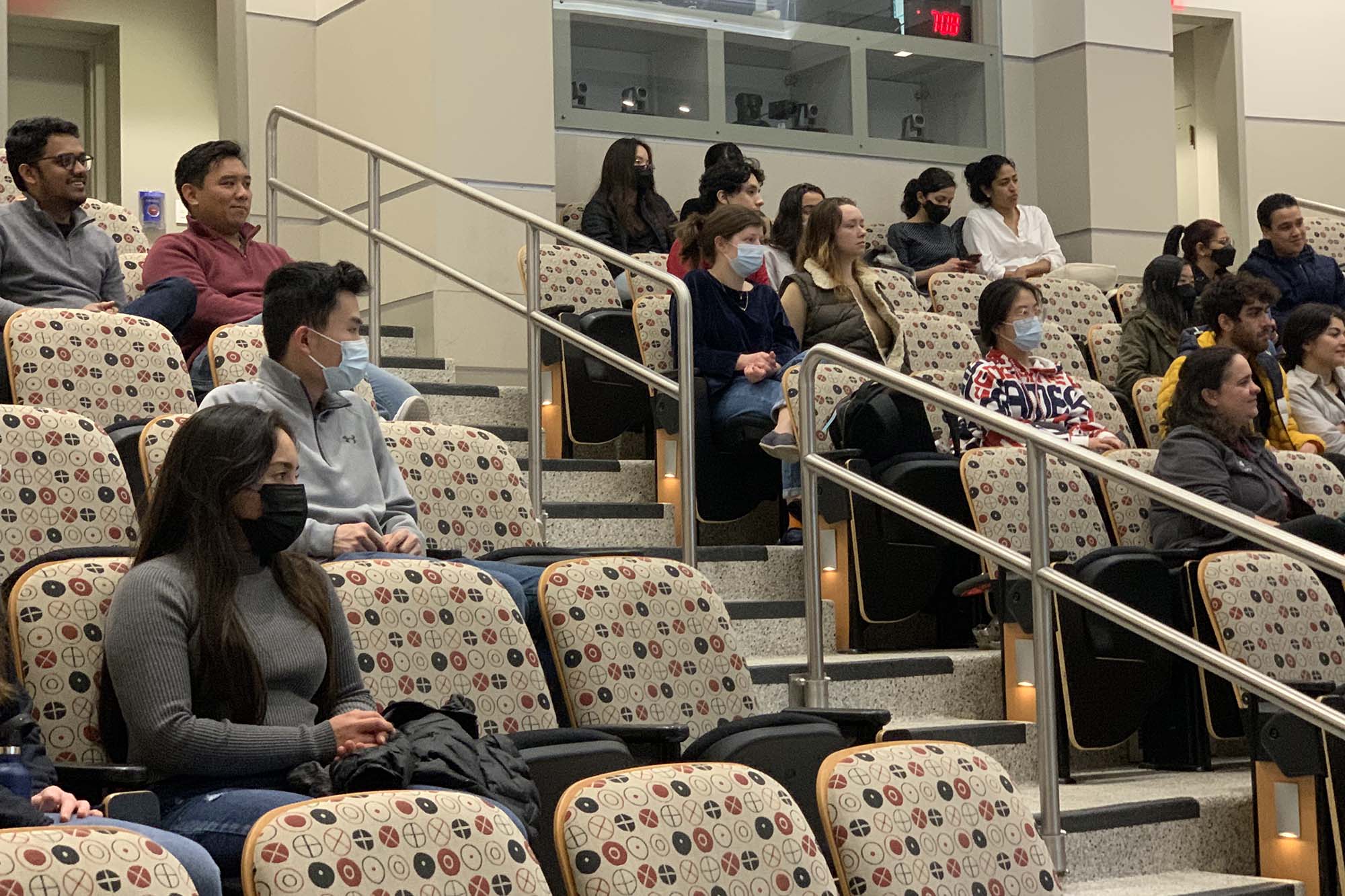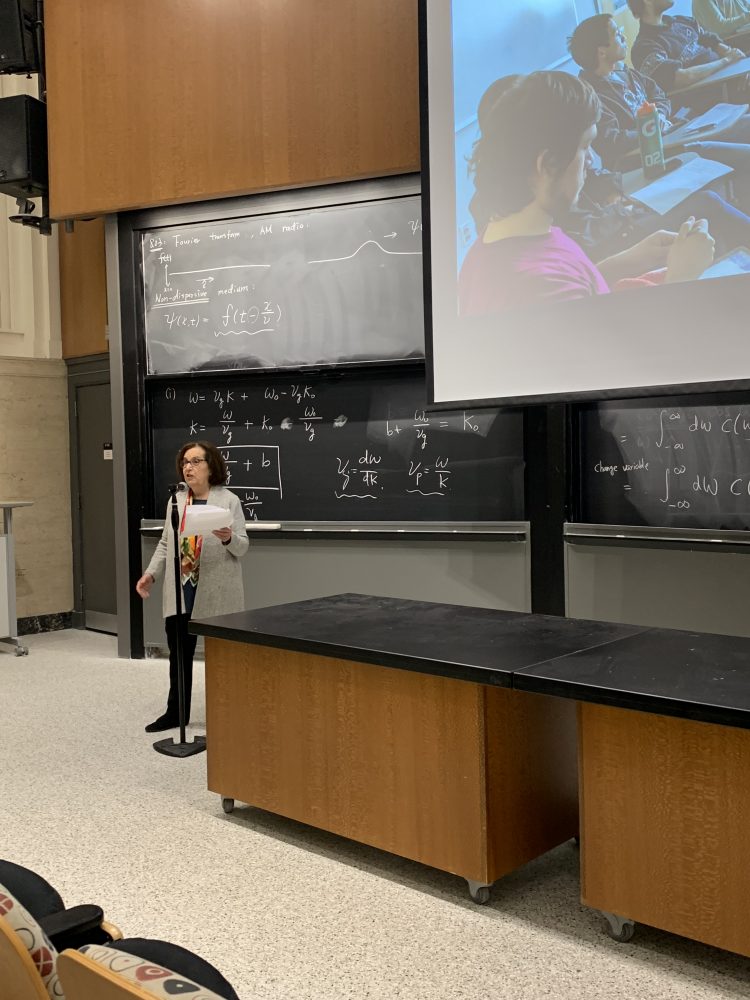
Over five successive Thursdays this spring, members of the MIT community came together for the MIT Ibero-American Film Festival 2022. The series created a shared space for reflection on topics such as race, gender, sexuality, and social class in the Latin American context, while carving out rare time for relaxation and entertainment among friends and colleagues.
The festival audience was treated to five recent, award-winning and critically acclaimed films by directors from Guatemala, Colombia, Venezuela, and Brazil. Featuring a diverse range of Latin American contexts and perspectives in Spanish, Portuguese, Kaqchikel (Mayan), and English (all with English subtitles), the films were introduced by scholars from MIT, Harvard, and Boston University. The featured films cover a wide range of issues, such as the clash between natives and newcomers, urban living, ecological degradation, family relations, and sexuality in a variety of genres: psychological thriller, science fiction, coming of age tale, and domestic drama. The roster comprised:
- Ixcanul (Volcano) (2015, Guatemala, Dir. Jayro Bustamante), introduced by Norvin Richards of MIT Linguistics
- Monos (2019, Colombia, Dir. Alejandro Landes), introduced by June Erlick of Harvard’s David Rockefeller Center for Latin American Studies
- Pelo malo (Bad Hair) (2013, Venezuela, Dir. Mariana Rondón), introduced by Margery Resnick of MIT Literature
- Bacurau (2019, Brazil, Dir. Juliano Dornelles, Kleber Mendonça Filho), introduced by Rodrigo Lopes de Barros of Boston University
- Que horas ela volta? (The Second Mother) (2015, Brazil, Dir. Ana Muylaert), introduced by Joaquín Terrones of MIT Literature
Students reflect on films’ impact
Students were impressed. Christopher Legerme, a first-year PhD student in Linguistics, called the film series “a blast,” and enthused, “the coming together as a community here at MIT to reflect on these stories and how our own experiences differ from or converge with the characters in these films was nice and I made some new friends along the way. My favorite movie of this event was Que horas ela volta? (2015) by Anna Muylaert which resonated a lot with my own Afro-Latino cultural background and my experiences being the first in my family to pursue graduate education.”
Joy Bhattacharya, class of 2024, observed, “Watching Pelo Malo was an eye-opening experience, as it felt like a window to another culture. Hearing [Margery Resnick’s] words before the movie was also helpful to better understand what the main themes and messages of the movie were. Overall, I hope more experiences like this are available in the future for more students.”
Ke “Coco” Li, an exchange student from Nanjing, China stated, “These films showed some aspects of Latin American society that I hadn’t thought about. As an urban studies student, I was saddened by some hopeless things shown in the movies, but then I realized how important it would be to make a good change for them. This festival gave me a better understanding of Latin America and provided me with some possible ideas for my research. I really enjoyed it!”
I did not expect the Brazilian cultural issues shown in the films to be so universal, and so pertinent to debates here in the US.
Theo Francis, class of 23, noted, “I will admit — somewhat self-consciously — that I did not expect the Brazilian cultural issues shown in the films to be so universal, and so pertinent to debates here in the US. Beyond the rich depiction of life in Brazil’s desert “sertão (backlands),” Bacurau’s incisive critique of the persistent colonist mindset made me reconsider what it means to be culturally aware as a visitor to any new place.” Theo affirmed that he was reminded “of the value of taking a global perspective to better understand my own society.” Following his viewing of the Ixancul,
Eldar Urkumbayev, class of 25, asserted that the film: “offered a lot of insight into Guatemalan society, and surprised me with how some traditions of Kaqchikel Maya are similar to the ones of my people, the Kazakhs.”
Reflects pride in Hispanic, Latino, Latinx roots
The series was organized by the Spanish and Portuguese Lecturers in Global Languages (Javier Barroso, Helena Belío-Apaolaza, Liana Ewald, Robert Herr, Mariana San Martín, Ana Yáñez, and Nilma Dominique), and was spurred by a sense of pride in the Hispanic, Latino, and Latinx roots of many in the Institute’s vibrant multicultural community. The festival aimed at putting a human face on issues particularly relevant to this sizable minority on campus while enhancing multicultural awareness essential in today’s globalizing world.
For those who love to crunch numbers (and who doesn’t at MIT?) some demographic information puts these goals in context:
- In the 2021-2022 academic year, 1,170 undergraduate and graduate students at the Institute identified as Hispanic, representing roughly 10% of the 11,934 total enrolled students. (MITFacts).
- These students boast a heritage from many of the 21 Spanish-speaking countries around the world (including Puerto Rico).
- Many of these Hispanic-identifying students are from the US, home to a population of 62.1 million Hispanics or Latinos, representing 18.7% of the population (gov).
- Of the 3,718 international students enrolled at MIT, 28% hail from Latin America and Europe (MITFacts), continents with the two largest Lusophone (Portuguese-speaking) populations in the world.
- Further, 58% of MIT’s international students come from Asia and Africa (MITFacts), continents in which 8 countries use Portuguese as their official or co-official language.
Community-building
In keeping with the community-building ethos of the festival, the MIT Ibero-American Film Festival 2022 was a true interdisciplinary and interdepartmental endeavor. It was generously funded by Global Languages, Council for the Arts at MIT, the Committee on Race and Diversity, Mind Hand Heart, and the Spanish Film Club/Pragda (an organization sponsored in part by Spain’s Ministry of Culture and Sport). It also enjoyed the endorsement of a wide range of departments, units, and organizations on campus: Literature; History; Program on Science, Technology and Society; Linguistics; Comparative Media Studies/Writing; Women’s and Gender Studies; MISTI Spain, Colombia, and Brazil; Hermanas Unidas; and Latino ERG.

Margery Resnick, MIT Literature, introduces the film Pelo Malo
